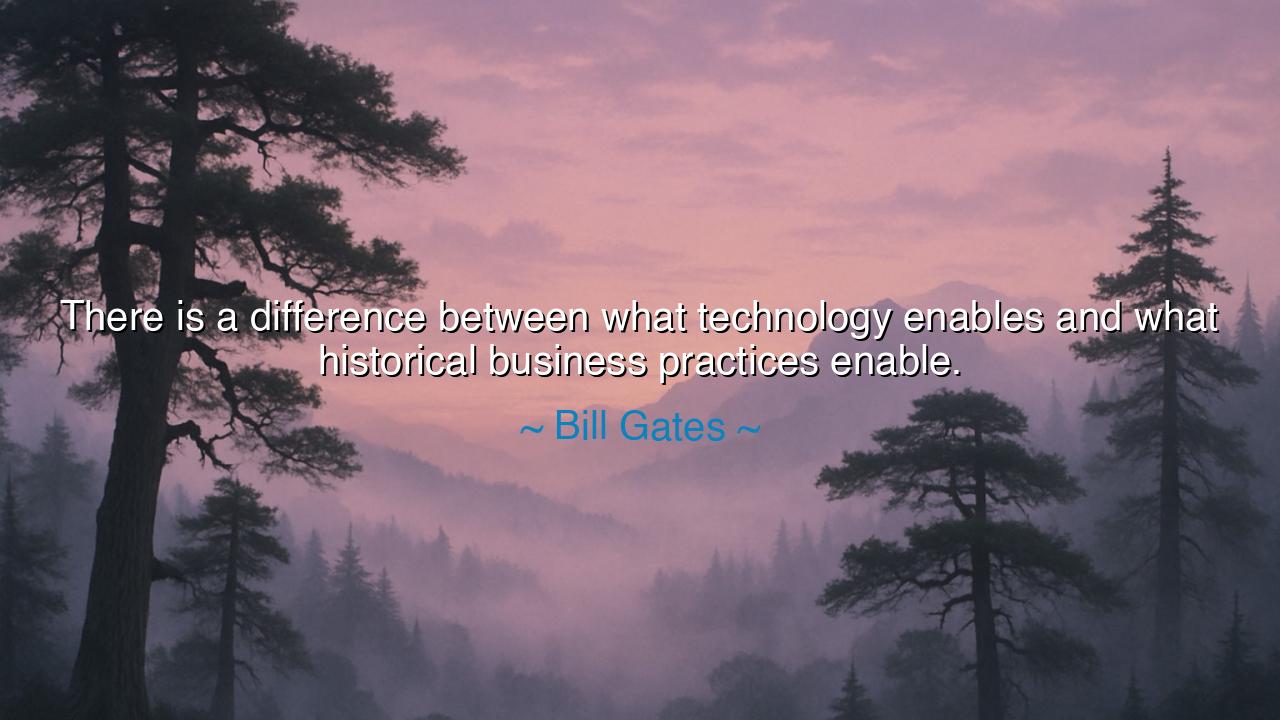
There is a difference between what technology enables and what
There is a difference between what technology enables and what historical business practices enable.






Bill Gates once declared with clarity and foresight: “There is a difference between what technology enables and what historical business practices enable.” These words are not mere musings of a man of wealth, but a teaching handed down to all who labor in the changing tides of human progress. For in them lies the eternal tension between the tools of the present and the traditions of the past. Technology is a river, ever flowing, breaking new channels through the stone of the world. Business practices, rooted in history, are like the levees and banks that guide the waters. To confuse the one for the other is to mistake the storm for the farmer’s plow, or the lightning for the torch.
From the earliest civilizations, humanity has faced this divide. When writing was first carved into clay tablets in Mesopotamia, it enabled the keeping of accounts and records on a scale never before imagined. Yet the business practices of that age — trade conducted by caravans and barter — could not yet harness the full power of written language. It took centuries before contracts, laws, and vast networks of commerce aligned with the new tool. Thus, Gates reminds us: invention by itself does not change destiny. It is only when human systems, traditions, and practices adapt that the full strength of invention is revealed.
Consider the printing press of Gutenberg, which poured out books with the power of multiplied hands. The technology enabled the spread of knowledge as fire leaps from spark to dry grass. Yet at first, the business practices of scribes, monasteries, and gatekeepers of learning resisted. They clung to their power, unwilling to surrender the old ways. But history shows that when practices bend to the tools of progress, the world is reborn — the Renaissance, the Reformation, the very birth of modern thought were carried on the shoulders of that adaptation.
The same truth can be found in more recent times. In the age before Gates, great companies like IBM built their kingdoms on old methods of contract and monopoly, while the new technology of personal computing was stirring in the hands of dreamers. Gates and others saw the difference. The machine alone could not conquer; it was the reimagining of business — licensing software, building ecosystems, creating new markets — that unleashed the transformation. The tool offered the power, but the practices decided how that power would shape the world.
This is the wisdom of the quote: do not assume that because a tool exists, progress is inevitable. The sword in the hands of the coward is nothing but iron. The wheel in the hands of the tribe that refuses to leave the old path is nothing but wood. But when human practice, discipline, and vision align with invention, then a new age begins. The chariot, the compass, the steam engine, the internet — all are examples of this union between what is enabled and what is truly embraced.
From this, let the lesson be taken: when confronted with new technology, ask not only, “What can this do?” but also, “What must I change to use it well?” For the danger lies not in rejecting the tool, nor in embracing it blindly, but in failing to reshape the habits, practices, and systems that will allow its power to flourish. If we cling only to tradition, we remain shackled. If we follow only novelty, we drift without anchor. But in the marriage of the two lies the path of wisdom.
Therefore, let the listener act with foresight: welcome the tools of the present with open hands, but also bend the structures of habit to fit them. Learn, adapt, and do not be afraid to question the practices of yesterday. For it is not technology alone that builds empires, nor business practice alone that sustains them, but the harmony between the two. In this, Gates speaks like the sages of old: reminding us that power without guidance is chaos, and tradition without renewal is decay. To understand the difference, and to act upon it, is to walk the road of mastery in this age of ceaseless change.






AAdministratorAdministrator
Welcome, honored guests. Please leave a comment, we will respond soon